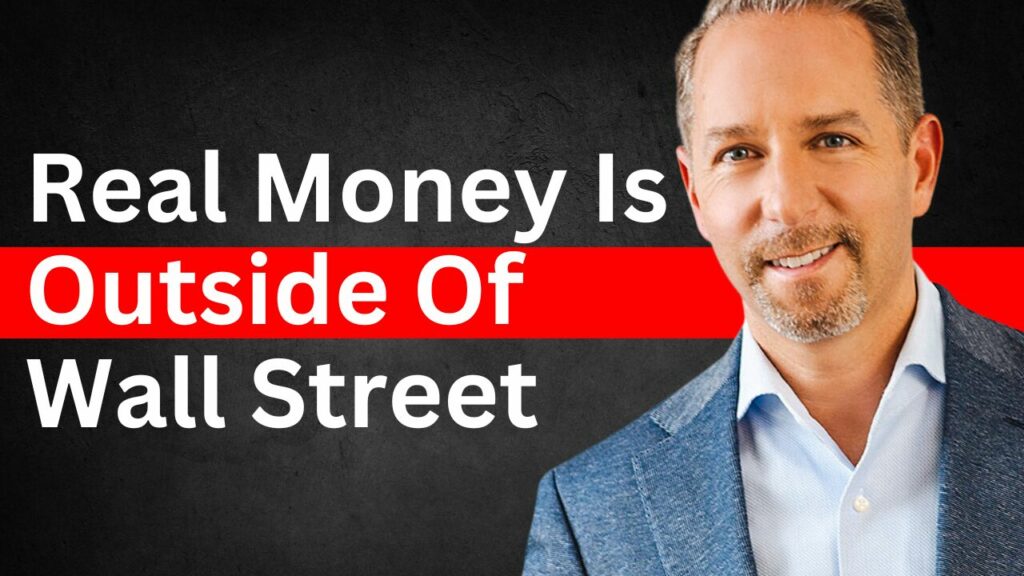
What the Ultra Wealthy Know (That Wall Street Won’t Tell You)
For years, most of us were taught the same financial formula:
Work hard, save diligently, invest in your 401(k), pay off debt, and someday hopefully retire.
But what if that entire formula was built to keep you dependent instead of free?
My guest, Dave Wolcott, knows that story firsthand. A former Marine Corps Captain and now a successful investor, author, and founder of Pantheon Investments, Dave discovered that the traditional financial playbook doesn’t work not for the middle class, and not even for high earners.
When his family suddenly grew overnight (thanks to triplets!), Dave realized he needed to do something radically different to secure his family’s financial future. What followed was a deep dive into the strategies of the ultra-wealthy the top 1% and even 0.01% of investors who don’t play by Wall Street’s rules.
And what he found completely changed his life.
The Middle-Class Money Trap
Like many of us, Dave was told to put his trust in financial planners, maximize his 401(k), and buy into “safe” government-sponsored plans like 529s.
But when he did the math, the numbers just didn’t add up.
Compounding 7% over 30 years might sound okay, but it doesn’t lead to financial freedom it leads to delayed freedom, and that’s assuming the markets cooperate.
That realization led Dave to a question most people never ask:
How do the ultra-wealthy actually build wealth?
The answer was clear: they don’t rely on public markets.
The Private Market Advantage
The wealthy invest primarily in private assets things like multifamily real estate, self-storage, private equity, and even energy projects.
In fact, Dave points to a fascinating data point from Tiger 21, a global network of ultra-high-net-worth investors:
The average member of Tiger 21 has a net worth of $100 million and only 22% of their wealth is in public markets.
The rest?
It’s tied up in cash-flowing, tax-advantaged, private investments that generate income and grow equity what Dave calls the “wealth trifecta.”
That trifecta includes:
- Tax Efficiency – Private investments often provide significant tax benefits.
- Current Cash Flow – They pay you now, not 30 years from now.
- Equity Growth – Strategic improvements and appreciation increase asset value over time.
Compare that to a 401(k) or stock portfolio, where your only hope is that prices go up—and even then, it’s taxable when you cash out.
Why Wall Street Doesn’t Teach This
The reason is simple: Wall Street profits from your money staying with them.
Financial advisors and brokerages get paid based on assets under management. The more of your money they keep invested in mutual funds and ETFs, the more they make regardless of whether you win or lose.
They aren’t trained (or incentivized) to teach you about alternative assets like real estate syndications, oil and gas investments, or private lending let alone tax-efficient strategies like Infinite Banking. Those aren’t in their toolbox.
So the system keeps you focused on accumulation saving and hoping rather than cash flow and control.
The Tax Code: A Roadmap, Not a Penalty
One of the biggest mindset shifts the wealthy make is how they view taxes.
While most people see taxes as something to minimize once a year, the wealthy see the tax code as a roadmap for how to partner with the government.
As Dave explains, the IRS provides powerful incentives for business owners and investors who do things that benefit the economy like providing housing, creating jobs, or developing energy.
That’s why high-income professionals stuck in the employee quadrant (from Robert Kiyosaki’s Cashflow Quadrant) often pay 50% or more in taxes, while investors and business owners can legally pay 20% or even 0% through strategic investments.
Reducing your taxes by 20–30% is like instantly increasing your rate of return by the same amount and it compounds year after year.
Infinite Banking: The Secret Weapon
Another tool the ultra-wealthy use is Infinite Banking (IBC) a strategy that uses properly structured whole life insurance as a personal banking system.
Here’s why it’s powerful:
- Your money compounds tax-free inside the policy.
- You can borrow against it to invest in other assets (like real estate) while your cash value keeps growing.
- It offers liquidity, flexibility, and legacy benefits your 401(k) never will.
Dave calls this approach “strategy stacking.”
It’s not about choosing between IBC or real estate it’s about combining them to multiply results.
For example, one of Dave’s clients funded an IBC policy, borrowed against it to invest in oil and gas, offset 90% of his active income taxes, and created two income-producing assets in one move.
That’s the kind of thinking that separates the wealthy from everyone else.
Real Wealth Is More Than Money
At the end of our conversation, Dave shared something profound:
“Too many people chase money to get rich. The truly wealthy build wealth in multiple dimensions financial, spiritual, emotional, and physical.”
That’s what we call a ripple effect.
When you build true wealth, you create freedom not just for yourself, but for your family, your community, and future generations.
Ready to Think Like the Ultra Wealthy?
If you’re tired of playing the Wall Street game and want your money working as hard as you do, it’s time to shift your mindset.
Get your free copy of Dave Wolcott’s book, “The Holistic Wealth Strategy,” at holisticwealthstrategy.com, and learn how to apply these principles in your own financial journey.
